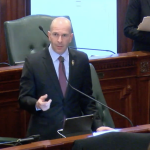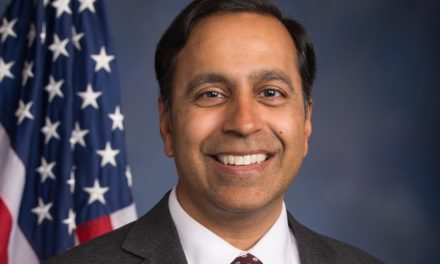
Panelists weigh in on hospital transformation

A panel of experts weighed in on hospital transformation at a Health News Illinois panel Tuesday at MATTER Health in Chicago.
Our panel is getting ready to discuss the future of hospital transformation, part of our #HNIpanelSeries. Thanks again to @MATTERhealth for hosting the event. pic.twitter.com/gq5CgTmgBu
— Health News Illinois (@HealthNewsIll) September 24, 2019
Anu Singh, a managing director at Kaufman Hall, said that hospital transformation is part of what will be a total transformation of the healthcare industry. He noted that the industry has been slower to embrace large-scale changes, compared to other industries.
But the rise in technology and other factors will require hospitals to step outside their comfort zones, Singh said.
“Whatever has made a hospital or health system successful over the last five or 10 years, looking in that rearview mirror, is likely not the same amount, type or quota of things that… are going to be key to future success and thriving in the market,” he said. “It’s going to have to pivot and change.”
Kara Friedman, an attorney with Polsinelli, said that healthcare systems are increasingly seeking to impact the health of their patients outside the four walls of their hospitals and clinics. But regulatory and reimbursement hurdles remain in the way.
“I get really concerned with how we’re going to care for people within and outside the health systems given the payer system that we have through the HealthChoice Illinois program and how we’re going to make any progress in improving the factors that affect social determinants of health like education, housing, access to food in certain neighborhoods,” she said.
Sen. Heather Steans, D-Chicago, a member of a state committee focused on hospital transformation, echoed Friedman’s sentiments.
“I think state regulations tend to hold back transformation and not assist transformation. I think we’ve been very slow to the table on that,” she said. “Our payment structures do not foster innovation, but instead hold it back. I think there is a lot we can be learning from folks in the industry on how we should be advancing a policy framework that better supports that integration across all systems to actually keep people healthier.”
George Miller, CEO of Loretto Hospital, said that transformation needs to include all stakeholders.
“Right now, in downtown Chicago, the life expectancy is 88 years of life. But if you go down the Eisenhower and take Exit 23B where I serve in Austin, life expectancy drops down to 68.2 years of life. You lose 20 years of life in a 20-minute drive,” he said. “There should not be a 20 to 30-year life expectancy difference in the same city with some of the finest healthcare organizations in the world. So transformation has to include all of us together, collaboratively, and you cannot leave anybody behind.”
Rep. Emanuel “Chris” Welch, D-Hillside, said that using technology to build upon existing hospital infrastructure is an important part of transformation. As are conversations about which services are necessary at a hospital. But he does not think the process should be used to close hospitals and create neighborhoods with limited access to healthcare.
“I do not believe hospital transformation means closing brick and mortar hospitals,” Welch said.
Ken Beutke, president of OSF HealthCare Saint Elizabeth Medical Center in Ottawa, said that for providers – especially those in rural areas – transformation means hospitals doing more to become a “one-stop-shop” for their patient’s healthcare needs. To achieve that, Beutke said providers need to collaborate with community partners to determine what services are needed and to remove barriers to care.
“So transformation, to me, is engaging the community to create ownership and collaboration and partnership to address what it is that drives the health and wellness of their communities,” he said.









